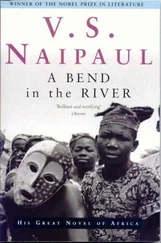V. Naipaul - Guerrillas
Здесь есть возможность читать онлайн «V. Naipaul - Guerrillas» весь текст электронной книги совершенно бесплатно (целиком полную версию без сокращений). В некоторых случаях можно слушать аудио, скачать через торрент в формате fb2 и присутствует краткое содержание. Год выпуска: 1990, ISBN: 1990, Издательство: Vintage, Жанр: Современная проза, на английском языке. Описание произведения, (предисловие) а так же отзывы посетителей доступны на портале библиотеки ЛибКат.
- Название:Guerrillas
- Автор:
- Издательство:Vintage
- Жанр:
- Год:1990
- ISBN:978-0679731740
- Рейтинг книги:5 / 5. Голосов: 1
-
Избранное:Добавить в избранное
- Отзывы:
-
Ваша оценка:
- 100
- 1
- 2
- 3
- 4
- 5
Guerrillas: краткое содержание, описание и аннотация
Предлагаем к чтению аннотацию, описание, краткое содержание или предисловие (зависит от того, что написал сам автор книги «Guerrillas»). Если вы не нашли необходимую информацию о книге — напишите в комментариях, мы постараемся отыскать её.
Guerrillas — читать онлайн бесплатно полную книгу (весь текст) целиком
Ниже представлен текст книги, разбитый по страницам. Система сохранения места последней прочитанной страницы, позволяет с удобством читать онлайн бесплатно книгу «Guerrillas», без необходимости каждый раз заново искать на чём Вы остановились. Поставьте закладку, и сможете в любой момент перейти на страницу, на которой закончили чтение.
Интервал:
Закладка:
At the beginning she had made some effort to put herself on his side or what she thought to be his side. Now, already, he was half on hers. He saw her as someone at odds with more than her job, her class, or England. She was at odds with something much larger; and toward that mystery, that private harassment which he had sensed in her in the restaurant, he began to be drawn.
She had married young, at seventeen or eighteen; she spoke of it as of an abduction. For a reason Roche couldn’t follow she blamed her mother and an uncle for this early marriage (her father had died when she was very young); and she blamed her school for sending her out uneducated and ready to throw herself at the first man she met.
She had married a man twice her age, a politician, thought then to be rising. He had since fallen, become a businessman; and though Jane now spoke with contempt of his politics and with sarcasm of his “beauty,” it was clear that she had been attracted by both his beauty and his eminence; and though she spoke of this marriage always as something forced upon her, it was clear from other things she said that she had been the pursuer, thinking to have found in the politician a unique combination of beauty, eminence, and wealth that no one before her had recognized. It appeared that the politician, not knowing that he was being chased by this schoolgirl, had had to be told by a friend, “Don’t you see that girl’s in love with you?” Jane spoke of this with sad pleasure, as of her only moment of romance, before the long disaster.
The beautiful politician had, during his extended bachelorhood, become fixed in the habits of his schooldays. He had masturbated even on their honeymoon, the young girl awake beside him; for stretches of the day, during this honeymoon, Jane had been left alone. “Of course,” she told Roche, giving him the first twinge of sexual alarm, “I wanted to be in bed all the time.” She spoke the limericks he had taught her, the passion-killing erotic rhymes. He was excited only by prostitutes, swiftly bought and had; with Jane he was finished in a second, preferring more usually to be “tossed off,” and Jane still spoke the words like a schoolgirl who had just acquired them, part of the mystery of men.
The man Jane described in this way had a modest public reputation and sometimes his picture appeared in the financial pages. He was about Roche’s own age, as Roche worked it out. Once admired, he was now altogether betrayed; and this gave Roche a further alarm. Perhaps she exaggerated; no doubt there had been other aspects of their life together. But her pitilessness about the man was also a pitilessness about her own life, shaped by that early shock and violation.
After two years there had been a divorce. But that had not brought real release. She hinted at a procession of lovers, a continuing violation; she spoke, with brutal detail, of the affront of her abortions. She spoke as though she had never exercised choice. Events, society, the nature of men, her own needs as a woman, had sent her out into the sexual jungle, to play perilously with the unknown.
Roche thought he understood. And so, within a fortnight, they had fallen into a relationship: Jane the violated, he, with a life in ruins, the comforter. He had penetrated swiftly to that core of passion he had divined in her. He was the one who understood: Jane behaved as if he was. And in her big, ugly kiss, so abrupt, so oddly childlike, whose aggressiveness yet took him aback, he thought he could read all her past.
That was less than nine months ago. And that understanding, at which they had arrived so soon, had turned out to be the limit of their relationship. It was only to that they could return after jars, strains, and irritations; she the violated, he the comforter; an understanding that for her seemed to be enough, but for him was increasingly sterile.
If they had stayed in London they might have separated as easily as they had come together; and that relationship, never going beyond promise, would have left only a faint impression on him. She would have dwindled away into the London background and he would have caught glimpses of her in other people, picked up echoes of her attitudes. He would have been able to place her; he would have been content to be another of her failures. But here on the Ridge, where she was as alien as he, and there was nothing to camouflage her, where the empty company house with the too-solid wooden furniture and the view of the exploding city at the foot of the brown hills reminded him of his own failure, here on the Ridge where his own vision of his future had begun to contract and then to blur, and he had become aware of his age, here he had become obsessed with her.
All that was to be known about her was clear at that first meeting: it was her total display. But what London had masked the Ridge now, too late, made plain. How often, in London, he had seen her casual irritations and hostility mistaken, as they had been mistaken by him, for a point of view. How easy it had been in that city for her simple impressionistic comments, borrowed from here and there, and some already borrowed from himself and distorted, to suggest a complete and coherent personality. In London, Roche now saw, Jane was an exotic; and perhaps she was aware that she was an exotic. Perhaps she was aware that her simple views, which would have been unremarkable in a woman of another background, were more than simple when she claimed them.
But here on the Ridge, where the modes of English speech were not known, and where, moreover, she was associated with Roche, what she said was taken literally. Here, where everyone lived in a state of suppressed hysteria, and where ambitions and jealousies no longer had to do with motorcars or houses or fine things, but with security — money shipped abroad, residence visas for Canada and Australia and the United States — and where even Harry de Tunja, a perfect Ridge man, had quietly established his status as a Canadian landed immigrant, here where people regarded their way of life as almost over, Jane, offering her casual nihilism, her casual outbursts about the coming crash and the disintegration of systems, was saying things people preferred not to listen to. And no one believed in her passion. She was from London; she had London to return to; she was not taken seriously.
At Mrs. Grandlieu’s one evening Roche had seen the young wife of a lawyer grow silent as Jane had talked on; and then the young woman, a pretty brown-skinned woman, neat in a tight-waisted blue dress, a touch of rouge on her cheeks, carefully made up for the evening in the great house, had frozen, had refused to acknowledge Jane’s presence. This was done quietly; not many people would have noticed; but Roche, contrasting the woman’s neatness and gravity with Jane’s gobbling talk and nervous manner, which now began to appear strident and hysterical — and Jane that evening was in a sack dress made of a kind of striped North African sacking — Roche for the first time, and to his great surprise, began to detect in Jane a physical gracelessness. Jane talked on; she seemed not to be aware of the effect she had been having. But she did know, and she had been wounded. She returned gloomy from the dinner, saying nothing: it was the beginning of her detachment, soon to turn to revulsion, from their life on the Ridge.
They were dull people, she decided, sheep being led to the slaughter; they deserved their future. She continued to find proofs of their dullness, and he watched her revulsion grow. More than once he heard her say, holding out the French lighter to someone who had asked to see the unusual model, “Sahara gas, I suppose.” It was the kind of comment she was used to throwing out, and this comment had doubtless been borrowed from the journalist of whom she sometimes spoke, one of those failed lover-violators. In London it would have been an interesting comment; to someone meeting her for the first time it would have suggested knowledge, alertness, a degree of political concern; it would have opened up so many conversational possibilties: France, Algeria, the Arabs, exploitation, the using up of the world’s natural resources. But here it was allowed to pass as just a geographical fact; no one knew how to take the matter further.
Читать дальшеИнтервал:
Закладка:
Похожие книги на «Guerrillas»
Представляем Вашему вниманию похожие книги на «Guerrillas» списком для выбора. Мы отобрали схожую по названию и смыслу литературу в надежде предоставить читателям больше вариантов отыскать новые, интересные, ещё непрочитанные произведения.
Обсуждение, отзывы о книге «Guerrillas» и просто собственные мнения читателей. Оставьте ваши комментарии, напишите, что Вы думаете о произведении, его смысле или главных героях. Укажите что конкретно понравилось, а что нет, и почему Вы так считаете.












